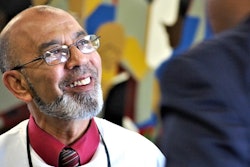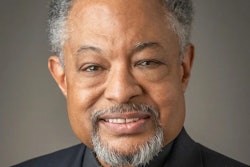Manning the Ship
More male scholars are showing up in women’s studies departments, but experts are hesitant to call it a trend just yet
By Shilpa Banerji
Statistically and historically speaking, most women’s studies departments are headed by women. So when Dr. David G. Allen, a psychosocial and community health professor at the University of Washington, was appointed chair of that institution’s women’s studies department last summer, it ruffled a few feathers to say the least.
“Women and women of color are woefully under-represented in academia,” says Allen, who has taught in the department for more than a decade. “Appointing a man to a position that is an obvious opportunity for a woman to gain administrative experience — and that historically has been held by women — requires some justification.”
Dr. Nancy J. Kenney, an associate professor of women’s studies at UW, says although she respects Allen as an individual and a colleague, she was initially worried about his appointment to head the department. She says she wondered what kind of message it would send to potential students. She also questioned whether there were any qualified women for the position. She wasn’t alone. Allen’s appointment generated quite a bit of controversy on the blogosphere and caught the attention of various media outlets, including The Associated Press and Fox News.
“The leadership style and vision of any department chair can be cause for worry,” Kenney says. “But we don’t want the mission and function of the department to be lost” amid the media attention.
“I am very, very unhappy with the stance taken by the University of Washington, saying there was no one else available other than this straight White guy,” Jeanette Bushnell, a UW doctoral candidate, told The Associated Press in November.
The university introduced its women’s studies program in 1970, making it one of the first institutions to do so. Today, UW is one of only 10 universities in the country that offers a doctorate in the discipline. Of those 10, only UW has a male in the top administrative position.
According to Dr. David Hodge, dean of UW’s College of Arts and Sciences, there were not enough funds available to lure an outside scholar to the program, so they turned their search inwards.
“Our practice is to have a search committee interview as many of the faculty, staff and students as possible to solicit their views on both the state of the department and potential candidates for chair,” says Hodge. “This committee then provides one on the state of the department and one on potential candidates. The divisional dean and I then typically meet with three or four individuals to discuss the department’s future and then we choose a new chair. In this instance, as in most instances, our choice reflected the majority view of the department.”
Allen had made it known that he would be interested in taking over as chair of the department, and most of the individuals the search party met with concerning the move were supportive of the idea. Not surprisingly, the job requires more than just administrative experience. A commitment to feminism is also a major component. Allen says he has both the experience and the passion for the job.
“I have long argued, and attempted to model, that people like me who are unfairly privileged by gender and skin color have the greatest moral imperative and resources to resist that privilege,” he says. “I have benefited in many ways from my time in women’s studies.”
Although his current situation is still rather unusual, Allen is not alone. Dr. Daniel Moshenberg, an associate professor of English at George Washington University, became director of the women’s studies program there in 2004. Two years earlier, Dr. John D’Emilio, a professor of history and gender and women’s studies, was tagged to lead the gender and women’s studies program at the University of Illinois at Chicago, a position he has since left.
Dr. Allison Kimmich, director of the National Women’s Studies
Association, says that the appointment of men into the discipline could be a very positive development, though it barely represents a trend. Other scholars say that as women’s studies programs evolve into interdisciplinary gender studies, it is feasible that more men could be drawn into the programs as students, professors and administrators.
Broadening Their Scope
Women’s studies programs have undergone significant change
in recent years. In many cases, interdisciplinary courses have been added, and as a result, some of the programs are now being renamed gender studies.
Feminist scholars have spent much of the past two decades debating gender and its relationship to sexuality, class, ethnicity, age, religion and other subjects. The wider scope is being reflected in the name of the departments. For example, last year the pioneering women’s studies department at the University of California, Berkeley officially changed its name to the Department of Gender and Women’s Studies.
“The renaming has been happening for the past five or six years, and issues of masculinity and femininity are attracting everyone, so the field is more fluid now,” says Dr. Linda Mizejewski, chair of women’s studies at The Ohio State University. She says there was a need for the transition as more male students began enrolling in health and social work professions, alluding to the evolving nature of male and female roles in the work place and home.
Allen’s background in nursing, with its relationship to health and women’s issues, makes him well suited to oversee women’s studies, Mizejewski says.
“It’s very encouraging to see him, but I don’t think he’s a symbolic figurehead,” she says. “He has good administrative skills.”
But like women, not all men are cut out for administrative positions. D’Emilio left his post after two years, citing health reasons.
“I thought I was ready, but I would never be ready,” says D’Emilio. “Administration doesn’t interest me.”
Early indications are that Allen will hold his own as the chair at UW. Even Bushnell, who was staunchly against Allen’s appointment, calls him “a very gentle person who listens to people … and [he is] very supportive of a wide variety of work that’s done in the department.”
© Copyright 2005 by DiverseEducation.com





















